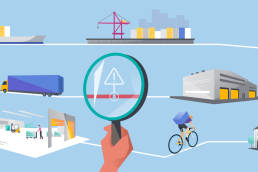The moment we start using location intelligence services like Google Maps, pretty much anyone looking for this information can pinpoint us on a map – with an alarming degree of accuracy.
However, more and more businesses are keen to restrict this. Let’s consider some of the risks, why privacy is important, and how companies should respond to ongoing challenges.
Track and Trace
When we use a service that incorporates location intelligence, we are in fact giving information about ourselves to the service provider – whether it’s Google Maps, OpenStreetMaps, or whoever.
In many cases an exchange of information is necessary to use a particular service – such as a smart phone, sat nav device or a dating app – and without handing over this information you won’t have access to the features.
In effect, there’s a trade off, which to the uninitiated can seem like a fair one. However, concern creeps in when this data is stored for too long, or when it’s passed on or sold to other companies.
From Safeguarding To Building Trust
As people become more broadly aware of data abuses – such as Cambridge Analytica’s use of Facebook – it’s important that companies of all kinds continually demonstrate good data practice, and exercise transparency in the ways they manage customer information.
Over the last few years, we’ve seen governments and independent organisations put protective measures in place to safeguard consumer data. However, even anonymised data and GDPR-compliant practices can offer insights into behaviours or trends – which a consumer may not have consented to through their initial data transaction.
From a business perspective, given how location data can be used to give companies a competitive advantage – in terms of how it’s used in marketing or logistics – opening up what’s essentially intellectual property to prying eyes can compromise their hard-earned market lead.
These are just some of the reasons why every company should make data protection a priority. But, adhering to GDPR or any other country specific regulations shouldn’t just be seen as a legal requirement or another ‘box to tick’. It’s also a vital way to build trust – which is increasingly important right now as the entire world emerges from the COVID-19 lockdown.
Getting The Right Balance
With this in mind, the widespread development of contact tracing apps to help fight COVID-19 is shining light on the continued debate concerning data privacy and individual security. Contact tracing apps at their core require accurate location data and other identifiers of individuals to work effectively.
The concern is that government-built apps designed to track the location and movement of citizens have the potential to creep toward surveillance apps for policing and the infringement of privacy. Everyone wants to beat this virus, but we can’t lose sight of the fact that in helping track its progress we may be sacrificing more than we realise.
The European Commission is encouraging a common approach for the design of contact tracing applications and pushing to ensure that data is anonymised.
The challenges developers face is finding the perfect balance between accurate data to help protect against the virus, and anonymising that data to protect people’s privacy.
An Ever-Changing Environment
As technology gets more sophisticated, there will be even more demand for richer targeting data – from sectors as diverse as finance to online retail. This put an enormous responsibility on developers All things considered, even with good practices in place, with skilled people carrying them out, and with the very best of intentions, companies need to understand that location intelligence – like any other form of data – continues to be used in an ever-changing environment.
But rather than shy away from the responsibility, developers should look at it as an opportunity to innovate – to stay ahead of the curve and take a proactive stance on data protection and online privacy: in a way that’s both transparent and responsible.
No-one said it was gonna be easy…



